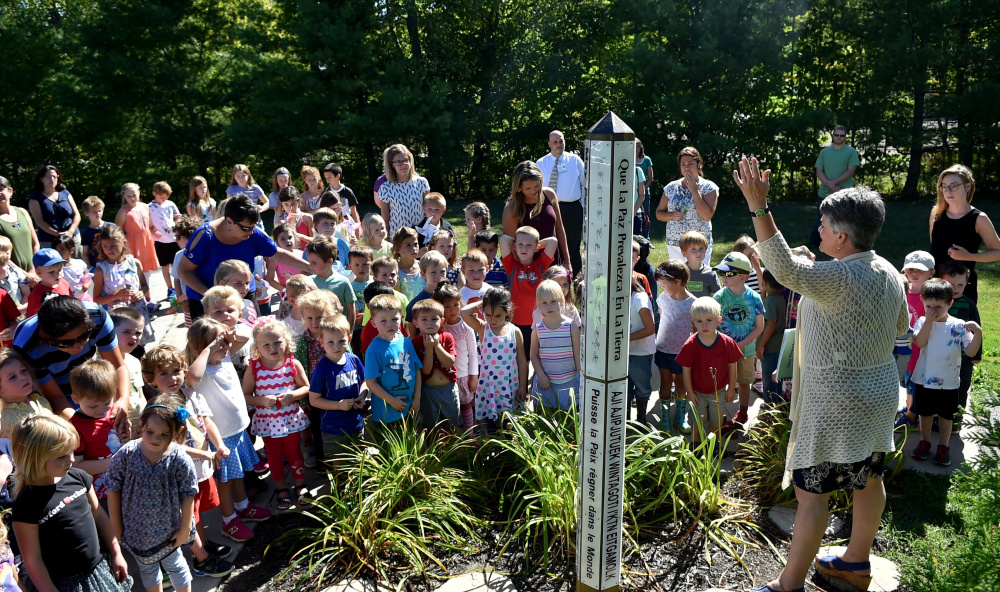The Kennebec Montessori School in Fairfield is in line for a cash infusion from the U.S. Department of Agriculture to build an addition to the school for expanded upper elementary-level classes.
The school, on Sheridan Drive in the Fairfield Business Park, recently was named as a recipient of a community facilities direct loan in the amount of $700,000 as part of the USDA’s Rural Development fund program.
The money will be used to build a 2,400-square-foot addition to the school. Officials said the project will provide the space needed to accommodate growing enrollment and that the loan will be paid back at low interest, probably around 2.3 percent annually, over 40 years.
“It’s fantastic. It just makes this project possible,” Rebecca Green, head of school, said Thursday. “If we had to go to the bank for a loan, it would mean we’d have to raise tuition much higher. This way we can keep our tuition as low as we can to make this school affordable for as many people as possible.”
The Kennebec Montessori School, a nonprofit alternative school in Fairfield that draws students from tuition-paying families in 10 area districts, has 103 students and 18 staff members in five classrooms. The school, built in 1995, already began growing in 2016 with a new combined grade level classroom added last year.
Green said the school is one of only four in Maine that are accredited by the American Montessori Society. She said the Montessori name is not copyrighted and therefore can be used by anyone who wants to open a private school. The school will hold a workshop for parents and prospective students at 4:30 p.m. Jan. 11.
Maria Montessori, the founder of the Montessori educational philosophy, was a three-time nominee for the Noble Peace Prize who encouraged teachers to cultivate peace and courtesy in their classrooms in addition to the idea that children learn best from their environment. Montessori, who died in 1952, was the first female physician in Italy. She opened the first “Children’s House,” called Casa dei Bambini, in 1907 in a tenement building in Rome.
Recognizing that children possess a natural desire to learn, she developed a curriculum to enable them to explore their curiosity independently in an environment oriented to children — an idea that was revolutionary at the time.
Today there are more than 20,000 Montessori schools worldwide, including 4,500 in the United States, many of them public schools. Each Montessori classroom is a prepared environment, oriented to the child’s world and carefully designed by the Montessori-trained teacher, who guides the child’s activity and offers encouragement to persist in given tasks.
USDA Rural Development State Director Virginia Manuel on Thursday announced investments in six Maine communities, including the Fairfield school, totaling $11.1 million.
“These funds will improve the quality of life for the residents though enhanced infrastructure and essential community facilities,” Manuel said in a statement.
Manuel said the community projects will benefit thousands of rural Maine residents with improved access to wastewater infrastructure, health care and mental health programs and the expansion of a rural education facility at the Montessori School in Fairfield.
“I am pleased that USDA Rural Development could provide over $11 million to invest in projects that will have a major impact on the lives of the residents in these rural Maine communities,” she said.
Here are the other five Maine projects selected to receive USDA funding:
• Winter Harbor Utility District will receive $4.6 million. The funding comes from a Water and Waste Farm Bill loan for $2.3 million and a $2.3 grant to upgrade the district’s wastewater treatment facility and collection system.
• Penquis Mental Health Association will receive a community facility direct loan for $170,000 to purchase an existing residential facility that will provide development and intellectual disability services. This project will provide a place for the association’s Adult Residential Supported Living program.
• The city of Eastport will receive a total of $4 million. The money comes from a Water and Waste Farm Bill Section loan for $2 million and a grant for $2 million to upgrade the city’s wastewater treatment facility and collection system.
• Fish River Rural Health will receive a community facility direct loan for $1.3 million to build a medical facility in Fort Kent. The U.S. Department of Health and Human Services has designated the area as a medically underserved area for primary care, mental health and dental health. Fish River Rural Health is a federally qualified health center with clinic locations in Eagle Lake and Fort Kent.
• Waldoboro Utility District will receive $300,000. The money comes from a water and waste direct loan of $200,000 and a grant for $100,000 for upgrades to the district’s sewer distribution system.
Doug Harlow — 612-2367
Twitter:@Doug_Harlow
Copy the Story LinkSend questions/comments to the editors.




Success. Please wait for the page to reload. If the page does not reload within 5 seconds, please refresh the page.
Enter your email and password to access comments.
Hi, to comment on stories you must . This profile is in addition to your subscription and website login.
Already have a commenting profile? .
Invalid username/password.
Please check your email to confirm and complete your registration.
Only subscribers are eligible to post comments. Please subscribe or login first for digital access. Here’s why.
Use the form below to reset your password. When you've submitted your account email, we will send an email with a reset code.